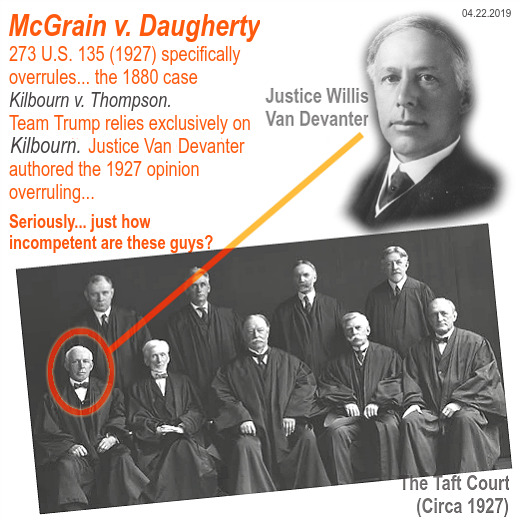 I'll just note quickly again (ever short on time, these days!) -- Trump will lose here. We will see the Mazars LLP financial information -- perhaps before the late fall of 2019.
I'll just note quickly again (ever short on time, these days!) -- Trump will lose here. We will see the Mazars LLP financial information -- perhaps before the late fall of 2019.
Here is the Nadler Committee's latest, and fine, 37 page brief, in full -- do go read it all:
. . . .The Department of Justice’s amicus brief posits, with no grounding in history or law, an astounding and novel theory of limited Congressional power to conduct investigations and oversight. The Constitution vests Congress with “[a]ll legislative Powers,” U.S. Const., Art. I, § 1, and charges the President with the duty to “take Care that the Laws be faithfully executed,” U.S. Const., Art. II, § 3. These powers are separate, as the Department repeatedly emphasizes. But they are also part of “the balanced power structure of our Republic,” Youngstown Sheet & Tube Co. v. Sawyer, 343 U.S. 579, 634 (1952) (Jackson, J., concurring), which the Department overlooks. The Supreme Court has held that Congress’s power to investigate extends to any “subject. . . on which legislation could be had.” McGrain v. Daugherty, 273 U.S. 135, 177 (1927). The Court has also emphasized that “separation of powers does not mean that the branches ‘ought to have no partial agency in, or no control over the acts of each other. . . .’”
Without acknowledging this history, the Department urges this Court to intrude on the U.S. House of Representatives’ exercise of its Article I power in ways that are flatly inconsistent with Supreme Court precedent. . . .
The Department contends (at 1) that these unprecedented restrictions on Congress are warranted because—in the Department’s view—the Oversight Committee’s subpoena might harass the President. This argument disregards the Constitution’s balance of powers, as well as the facts here, which establish that the subpoena does not actually intrude on the President’s exercise of his official duties. This suit was initiated by Mr. Trump (not the Oversight Committee) in his individual (not official) capacity to enjoin the production of non-privileged material held by a third party. This case presents no basis for this Court to impose sweeping new limitations on Congress’s core constitutional powers. . . .
Where appropriate, Presidents have at times raised executive privilege and other claims in efforts to protect information. Here, however [without a single case supporting this novel attempt to change existing federal law], the Department asks this Court to go beyond that noncategorical privilege and create new constitutional doctrine insulating the President from Congressional oversight based entirely on generalized separation-of-powers principles. . . .
Finally, the Department incorrectly contends that “a congressional subpoena’s validity always presents questions ‘of unusual importance and delicacy.’” DOJ Br. 1 (quoting McGrain, 273 U.S. at 154). McGrain decided an important and delicate issue in 1927. It is now settled that Congress has the power of compulsory process, and the President should not stand in the way of Mazars’s “public duty.” United States v. Bryan, 339 U.S. 323, 331 (1950), to respond to the subpoena. . . .
Onward -- with peaceful coming, and going, greetings -- for all people of good will. . . . we may be scarce here, until after the long Labor Day weekend, now. Be excellent to one another!
नमस्ते
















No comments:
Post a Comment